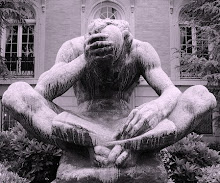- in his tour of his apartment, he often repeats "this is my..."
- he wears Levi's like a good Eastern European, so he can have shaggy-assed hair and sweat through his shirt all he wants, but he's still Americanized
- he messes with his nose enough that I think he's a coke head (since he looks like he's tweaking most of the time)
In his book, he tells the joke about the German in Siberia who has no red ink (I'm not going to repeat the joke), and he associates that with a Western idea of freedom. We are totally free--except we don't have any red ink. The ink here is the language with which we may express our lack of freedom, but I would respond (as I'm sure many, many before me have) that if we don't have the language to express our lack of freedom, then we cannot conceive our lack of freedom, and if we cannot conceive it, in some ways it cannot exist. At the very least, we cannot know of it. So what I suspect Zizek is asking of us to do is to take his word for it, to have faith in his giant IQ and just assent. No thanks.
Zizek evokes quantam theory, so I will bring it up, too. If there is some sort of lack of freedom extant outside our experience, it is just as likely that there is not a lack of freedom outside our experience (see Schrodinger's cat and--to a lesser extent--Heisenberg's uncertainty principle). Until we can observe and/or measure that lack of freedom, it cannot truly exist. But since it is beyond our linguistic ability to capture or express, then how can we know it exists?
Language--and here I am closely following Lacanian ideas-- structures the mind and thought itself; so how in the world can there be a lack of freedom that we cannot express, that is beyond language? That would necessitate a return from the Symbolic to the Real and would in turn necessitate a dissolution of the self and (mistaken) identity. Is the lack of self (or a facade that we mistakenly represent as the self) preferable to a lack of freedom?
I guess Lacan would say yes to that question since the whole point of the psychic narrative arc is a frustrated return to the womb, to the Real.

No comments:
Post a Comment